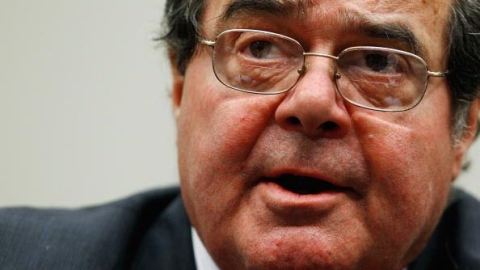Scalia’s Dissent in the Gay Marriage Ruling is a Dangerous Attack on American Democracy Itself

In the middle of the celebration of the Supreme Court decision establishing same-gender marriage is an ominous attack on democracy itself from one of the highest constitutionally sworn officers in America, Supreme Court Justice Antonin Scalia. His dissent (appended to the full ruling) is a direct call for Americans to abandon their trust in and support for the institution of the Supreme Court and indeed in American democracy itself. Scalia’s message is frightening anti-government rhetoric so harsh and polarizing that it is potentially far more damaging to America than anything in the gay marriage ruling he laments.
Scalia’s dissent says, “I write separately to call attention to this Court’s threat to American democracy.” And why does he think that threat exists? Because:
It is of overwhelming importance … who it is that rules me. Today’s decree says that my Ruler, and the Ruler of 320 million Americans coast-to-coast, is a majority of the nine lawyers on the Supreme Court.
Buried beneath the mummeries and straining-to-be-memorable passages of the opinion is a candid and startling assertion: No matter what it was the People ratified (in states that passed bans on gay marriage), the 14th Amendment protects those rights that the Judiciary, in its ‘reasoned judgment,’ thinks the 14th Amendment ought to protect.
In other words, Justice Scalia is unhappy that the Supreme Court gets to make the final call. He is rejecting the very right of the Supreme Court on which he sits to adjudicate disputes where the answer requires interpretation of the Constitution, (which is of course precisely what the court did when it interpreted the Second Amendment to enshrine the personal right to own guns, an opinion Scalia wrote), a role that has proven to be a corner stone of American democracy. Because he is upset by this ruling, Justice Scalia directly rejects the authority of the court itself.
But he goes further in undermining public trust in the court.
“And to allow the policy question of same-sex marriage to be considered and resolved by a select, patrician, highly unrepresentative panel of nine is to violate a principle even more fundamental than no taxation without representation: no social transformation without representation.”
Outrageously, he calls the ruling “a judicial putsch.” What incendiary rhetoric. The definition of the word putsch, as a man as erudite as Justice Scalia knows is:
“a violent attempt to overthrow a government.”
Scalia’s language is so harsh and divisively tribal that it could be a tract from a right-wing anti-government radical group.
“… the Federal Judiciary, which consists of only nine men and women, all of them successful lawyers, is hardly a cross-section of America. Take, for example this court, which consist of only nine men and women, successful lawyers who studied at Harvard or Yale law school. Four of the nine are natives of New York City. Eight of them grew up in east- and west-coast States. Only one hails from the vast expanse in-between. Not a single Southwesterner or even, to tell the truth, a genuine Westerner. (California does not count.) Not a single Evangelical Christian (a group that comprises about one quarter of Americans) or even a Protestant of any denomination. … To allow the policy question of same-sex marriage to be considered and resolved by a select, patrician, highly unrepresentative panel of nine is to violate a principle even more fundamental than no taxation without representation: no social transformation without representation.”
What a polarizing misinterpretation of the very role of the judiciary as defined by the Constitution Scalia so solemnly invokes. The judiciary was never intended to be the representative part of democracy. Scalia knows that. His ideological anger at today’s decision clouds his reason into saying things that are laughable in a high school civics class.
Scalia charges that
“… this practice of Constitutional revision by an unelected committee of nine, always accompanies (as it is today) by extravagant praise of liberty, (Scalia’s majority decision interpreting the Constitution’s Second Amendment right to own guns is laced with the same language he here laments) robs the People of the most important liberty they assert in the Declaration of Independence and won in the Revolution of 1775: the freedom to govern themselves.
A system of government that makes the People subordinate to a committee of nine unelected lawyers does not deserve to be called a democracy.”
What an astoundingly, nearly treasonous thing to suggest for a justice of the Supreme Court. Scalia believes issues like gay marriage should be determined by the people, at the state level.
“… win or lose, advocates of both sides continued pressing their cases, secure in the knowledge that an electoral loss can later be negated by an electoral win. That is exactly how our system of government is supposed to work.”
Well no, Mr. Supreme Court Justice Scalia, that is patently not true. You and your colleagues serve on the very institution American democracy has always relied on to resolve conflicts that arise when the electorate in one state sees things one way and another state’s electorate sees the issue another way, or when a state law tramples on rights covered by the overarching federal law of the Constitution, which you so solemnly invoke. Your selective view of which branch of government gets the final say is not just the argument of the side that lost. Coming from a person in your position, such an argument is poisonous, harmful, and breeds mistrust in both the Supreme Court you serve and government itself.
If you have any doubt left that Scalia is proposing that today’s decision should undermine trust in the court, he closes by noting that the Judicial Branch of government has no real power in the Constitution to enforce its rulings. The court’s power ultimately rests entirely on the public’s acceptance of their role to be our final interpreters of law.
“With each decision of ours that takes from the People a question properly left to them — with each decision that is unabashedly based not on law, but on the “reasoned judgment” of a bare majority of this Court — we move one step closer to being reminded of our impotence.”
Far more than today’s decision itself, Justice Scalia’s ideological, angry attack on the very standing of the Supreme Court to make such rulings dramatically moves the court in that direction. His language does America great harm.
(image courtesy Wikipedia)





